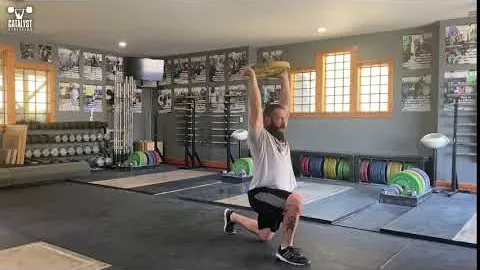
The Overhead Walking Lunge Plate exercise is a challenging and effective movement that targets several major muscle groups, including the legs, glutes, shoulders, and core. This exercise not only helps build strength and stability but also improves posture and enhances overall athletic performance. In this article, we will delve into the specifics of performing the Overhead Walking Lunge Plate exercise, its benefits, precautions, and variations to cater to different fitness levels.
Equipment Needed: To perform the Overhead Walking Lunge Plate exercise, you will need a sturdy weight plate or a dumbbell. Start with a weight that challenges you but still allows you to maintain proper form throughout the movement.
Starting Position: Stand tall with your feet hip-width apart while holding the weight plate or dumbbell overhead, arms fully extended. Ensure that your core is engaged and your shoulders are relaxed away from your ears.
Execution: Take a large step forward with your right foot, lowering your body into a lunge position. Simultaneously, maintain the weight plate or dumbbell overhead, keeping your arms extended. Ensure that your front knee is directly above your ankle, forming a 90-degree angle. Your back knee should hover just above the ground.
Moving Forward: Push off with your back foot, bringing it forward to meet the front foot. Repeat the lunge on the opposite leg, alternating between the left and right side with each step forward. Maintain a controlled and steady pace throughout the exercise.
Repetitions: Aim for 10 to 12 repetitions on each leg, gradually increasing the number as you build strength and stability. Perform 2 to 3 sets of the Overhead Walking Lunge Plate exercise, allowing adequate rest between sets.
Strengthening the Lower Body: The overhead walking lunge plate exercise targets the quadriceps, hamstrings, glutes, and calves, helping to increase leg strength. As you progress, you'll notice improvements in your ability to perform everyday activities.
Enhancing Core Stability: To maintain proper form during the overhead walking lunge plate exercise, you must engage your core muscles, including the abdominals and obliques. Strengthening these muscles enhances stability and can improve your balance and posture.
Improving Shoulder Stability: Holding the weight plate or dumbbell overhead throughout the exercise challenges the shoulder muscles, including the deltoids and trapezius. This, in turn, leads to enhanced shoulder stability and strength.
Boosting Athletic Performance: The overhead walking lunge plate exercise is a functional movement that mimics walking or running. It helps improve overall functional strength and performance, making it beneficial for athletes in various sports, such as running, soccer, or basketball.
Enhancing Flexibility: Performing the overhead walking lunge plate exercise requires adequate hip flexibility. Regular practice of this exercise can help increase your hip range of motion, allowing for better mobility in day-to-day activities.
Calorie Burning: The overhead walking lunge plate exercise is a compound movement that activates multiple muscle groups simultaneously. This engagement of major muscle groups can help boost calorie burning and aid in weight management.
Start Light: If you are new to this exercise, begin with a lighter weight to focus on proper form and technique. Gradually increase the weight as you become more comfortable with the movement.
Maintain Proper Posture: Ensure that your back remains straight throughout the exercise, avoiding any excessive forward lean. Keep your shoulders relaxed and away from your ears to prevent unnecessary strain.
Practice Controlled Movements: Emphasize controlled movements during both the lunge and the step forward. This helps to engage the targeted muscles effectively while minimizing the risk of injury.
Breathe Properly: Inhale deeply during the initial step forward and exhale as you bring your feet together. Maintaining a proper breathing pattern aids in stabilizing your core muscles.
Listen to Your Body: Pay attention to your body's signals. If you experience any pain or discomfort, adjust your form or reduce the weight. It's crucial to prioritize safety and avoid overexertion.
Goblet Walking Lunge: Hold a weight plate or dumbbell at your chest level instead of overhead. This variation still targets the lower body muscles while reducing the demand on shoulder stability.
Single-Arm Overhead Walking Lunge: Perform the exercise using only one arm to hold the weight plate or dumbbell overhead. This creates an added challenge for the core and shoulder muscles.
Reverse Walking Lunge: Instead of stepping forward, take a step backward into a lunge position. This variation places more emphasis on the glutes and hamstrings, while still targeting other lower body muscles.
Weighted Vest or Barbell: Instead of using a weight plate or dumbbell, you can wear a weighted vest or hold a barbell on your back. This variation increases the resistance and amplifies the challenge.
Incorporate the Overhead Walking Lunge Plate exercise into your training routine to enhance your strength, stability, and overall performance. Remember to start with a suitable weight, maintain proper form, and listen to your body. With consistency and dedication, you'll reap the numerous benefits this exercise has to offer.
If you're looking for a gym, fitness club or yoga studio, you've come to the right place.
You can find information about gyms in your area. Browse catalog of gyms and find gyms with classes which are you looking for.
On gym page you can find simple information like address, phone or website. You can find list of available classes. You can check availability of personal training or small group classes. On place page you can also see information about open hours.
You can find gyms near you with amenities, courts, studios and equipments.
Use our map to find gym at your city or district.
In Gym Navigator you can find list of exercises with movies for many body parts.
You can browse exercises catalog and find exercises the best of you.
You can also find exercises grouped into workout plans, which you can use to improve you body. Each routine show you exercises one by one and give you possibility to count you progress and count down rest time.